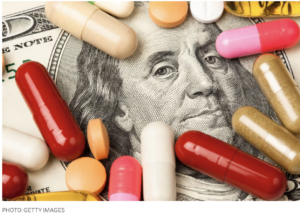
The latest news in the financial world is “price controls.” This approach to economics was put forth by the Biden Administration two years ago with the Inflation Reduction Act (IRA), a misnomer for legislation that only added to our inflation problem. The intent of this legislation was to reduce prices on prescription drugs.
It makes good political sense to tell seniors you’re going to lower the price of their prescription drugs. What you won’t tell them, however, is this same move will reduce the development of new medicines.
The Wall Street Journal editorial board tells us Charles River Laboratories, a top research contractor that helps drug makers with clinical trials, warned in its quarterly earnings report that pharmaceutical companies are slashing research and development owing to the IRA’s drug price controls.
“There are profound cuts” at pharmaceutical companies that reflect a “rapid deterioration” of their business, CEO James Foster said. He added: “A lot of these decisions have been taken relatively recently and probably more to come and haven’t been taken yet.” Might drug makers be hedging their investments because Democrats look more likely to hold the White House?
WSJ explains: “The IRA let Medicare “negotiate” prices for 10 to 20 drugs a year and a total of 60 by 2029. Negotiate is a euphemism for extortion: Drug makers that don’t participate or reject the government’s price face a daily excise tax that starts at 186% and climbs to 1,900% of a drug’s daily revenue.”
The law also requires manufacturers to pay the government rebates on medicines sold to Medicare if they raise prices more than the rate of inflation, and puts them on the hook for more of the entitlement’s Part D costs. Democrats used the resulting estimated “savings” of some $160 billion to pay for the green new deal.
WSJ says, “But subsidized solar panels won’t help if you get sick. The inevitable, albeit invisible, result of Democrats’ raid on pharmaceutical companies will be fewer new medicines.”
Roche CEO Thomas Schinecker said last summer that “we have decided that we are not going to do certain trials, or that we are not going to do a merger or acquisition or licensing [deal] because it is becoming financially not viable.” Astra-Zeneca also warned that it might delay launching some cancer medicines because of the IRA.
Some 90% of drug candidates fail in clinical trials, and manufacturers sometimes never recoup their investment on even those that are approved. They use profits from their few commercial successes to finance research and development into new medicines and to compensate investors. The IRA threatens this risk-reward model.
Despite these obvious drawbacks of price controls on the manufacture of prescription drugs, Democratic presidential nominee Kamala Harris has just announced she will pursue price controls on food and groceries as a “solution” to our inflation problem. Just as it has reduced the supply of new medicines when used in the IRA, this use of price controls will inevitably lead to fewer supplies of food and groceries.
Here is what the WSJ editors have to say about that:
“Fixing prices is a recipe for shortages, as controls would discourage grocery suppliers. Voilà, empty store shelves. Price controls have led to shortages everywhere they’ve been tried, from Moscow to Caracas. The last American President to impose wage and price controls was Richard Nixon in the early 1970s. He had to stage a humiliating retreat amid shortages and market dislocations, and prices immediately soared when controls were lifted. If Ms. Harris really believes in this price-fixing, she lacks the most basic understanding of economics. If she is merely floating it to be able to get “price gouging” into a speech, her cynicism is also telling.”

